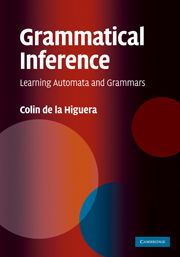Book contents
- Frontmatter
- Contents
- Preface
- Acknowledgements
- 1 Introduction
- 2 The data and some applications
- Part I The Tools
- Part II What Does Learning a Language Mean?
- Part III Learning Algorithms and Techniques
- 11 Text learners
- 12 Informed learners
- 13 Learning with queries
- 14 Artificial intelligence techniques
- 15 Learning context-free grammars
- 16 Learning probabilistic finite automata
- 17 Estimating the probabilities
- 18 Learning transducers
- 19 A very small conclusion
- References
- Index
14 - Artificial intelligence techniques
from Part III - Learning Algorithms and Techniques
Published online by Cambridge University Press: 05 July 2014
- Frontmatter
- Contents
- Preface
- Acknowledgements
- 1 Introduction
- 2 The data and some applications
- Part I The Tools
- Part II What Does Learning a Language Mean?
- Part III Learning Algorithms and Techniques
- 11 Text learners
- 12 Informed learners
- 13 Learning with queries
- 14 Artificial intelligence techniques
- 15 Learning context-free grammars
- 16 Learning probabilistic finite automata
- 17 Estimating the probabilities
- 18 Learning transducers
- 19 A very small conclusion
- References
- Index
Summary
Si al cabo de tres partidas de póquer no sabes todavía quien es el tonto, es que el tonto eres tú.
Manuel VicentThe training program of an artificial intelligence can certainly include an informant, whether or not children receive negative instances.
E. Mark Gold (Gold, 1967)In the different combinatorial methods described in the previous chapters, the main engine to the generalisation process is something like:
‘If nothing tells me not to generalise, do it.’
For example, in the case where we are learning from an informant, the negative data provide us with the reason why one should not generalise (which is usually performed by merging two states). In the case of learning from text, the limitations exercised by the extra bias on the grammar class are what avoid over-generalisation.
But as a principle, the ‘do it if you are allowed’ idea is surely not the soundest. Since identification in the limit is achieved through elimination of alternatives, and an alternative can only be eliminated if there are facts that prohibit it, the principle is mathematically sound but defies common sense.
There are going to be both advantages and risks to considering a less optimistic point of view, which could be expressed somehow like:
‘If there are good reasons to generalise, then do it.’
On one hand, generalisations will be justified through the fact that there is some positive ground, some good reason to make them.
Information
- Type
- Chapter
- Information
- Grammatical InferenceLearning Automata and Grammars, pp. 281 - 299Publisher: Cambridge University PressPrint publication year: 2010
Accessibility standard: Unknown
Why this information is here
This section outlines the accessibility features of this content - including support for screen readers, full keyboard navigation and high-contrast display options. This may not be relevant for you.Accessibility Information
- 2
- Cited by
